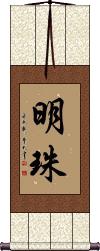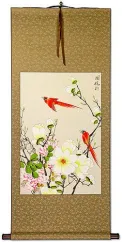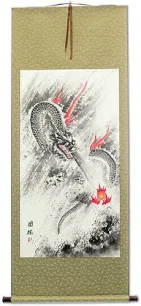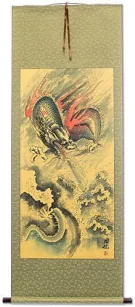Many custom options...
And formats...

Bright Pearl in Chinese / Japanese...
Buy a Bright Pearl calligraphy wall scroll here!
Bright Pearl
This means bright pearl or jewel of great value.
明珠 is a female given name Mingzhu in Chinese or Meishu in Japanese.
This in-stock artwork might be what you are looking for, and ships right away...
Gallery Price: $300.00
Your Price: $138.88
Gallery Price: $240.00
Your Price: $138.88
Gallery Price: $240.00
Your Price: $138.88
Gallery Price: $72.00
Your Price: $39.88
Gallery Price: $300.00
Your Price: $128.88
Not the results for bright pearl that you were looking for?
Below are some entries from our dictionary that may match your bright pearl search...
| Characters If shown, 2nd row is Simp. Chinese |
Pronunciation Romanization |
Simple Dictionary Definition |
明珠 see styles |
míng zhū ming2 zhu1 ming chu meishu / meshu めいしゅ |
More info & calligraphy: Bright Pearl(given name) Meishu bright pearl |
摩尼 see styles |
mó ní mo2 ni2 mo ni mani まに |
Mani (3rd century AD), Persian prophet and founder of Manichaeism (1) {Buddh} jewel (san: mani); pearl; gemstone; (2) {Buddh} Cintamani stone; wish-fulfilling jewel; (surname) Mani maṇi; 'a jewel, gem, precious stone (especially a pearl, bead, or other globular ornament).' M.W. A bright luminous pearl, symbol of Buddha and his doctrines. Tr. 'as wished', or at wish, whoever possesses the pearl receives whatever he desires. One of the seven treasures. With Shivaites a symbol of the Liṅga. Also 末尼. |
明月 see styles |
míng yuè ming2 yue4 ming yüeh meigetsu / megetsu めいげつ |
bright moon; refers to 夜明珠, a legendary pearl that can glow in the dark; CL:輪|轮[lun2] (1) harvest moon; (2) bright moon; full moon; (place-name) Meigetsu The bright moon. |
明月珠 see styles |
míng yuè zhū ming2 yue4 zhu1 ming yüeh chu myōgetsushu |
明珠; 摩尼 The bright-moon maṇi or pearl, emblem of Buddha, Buddhism, the Buddhist Scriptures, purity, etc. |
一顆明珠 一颗明珠 see styles |
yī kē míng zhū yi1 ke1 ming2 zhu1 i k`o ming chu i ko ming chu Ikka myōju |
One Bright Pearl |
The following table may be helpful for those studying Chinese or Japanese...
| Title | Characters | Romaji (Romanized Japanese) | Various forms of Romanized Chinese | |
| Bright Pearl | 明珠 | mei shu / meishu | míng zhū / ming2 zhu1 / ming zhu / mingzhu | ming chu / mingchu |
Successful Chinese Character and Japanese Kanji calligraphy searches within the last few hours...













